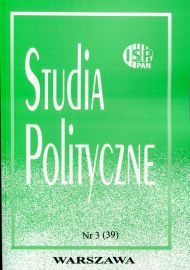Siedemdziesiąta rocznica Obławy Augustowskiej. W poszukiwaniu genezy ostatniej zbrodni sowieckiej na obywatelach polskich w lipcu 1945 roku
The Seventieth Anniversary of The Augustów Roundup. In Search of the Origin of the Last Soviet Crime on Polish citizens in July 1945
Author(s): Krzysztof JasiewiczSubject(s): Political history, Recent History (1900 till today), WW II and following years (1940 - 1949), Fascism, Nazism and WW II
Published by: Instytut Studiów Politycznych PAN
Keywords: Augustów Roundup; genocide; NKVD; SMERSH; special operations;
Summary/Abstract: In June 1945, Joseph Stalin ordered the Red Army General Staff to develop a plan to comb the Augustów Primeval Forest in order to trap and dispose of Polish partisan groups. This operation was conducted in July 1945 by the Red Army units of the 3rd Belorussian Front numbering about 45,000 soldiers, who were supported by the 62nd Division of the NKVD Internal Troops (USSR), a group of Polish Army soldiers and secret political police officers (UB). The main operation was carried out on 12-19 July 1945 and involved scouring the forests of the then districts of Augustów, Suwałki, Sejny and Sokółka in the Białystok province. As a result, 7,049 people were arrested, 5,115 of whom were released after revision. About 2,000 of detainees were probably killed. The reasons for this genocidal decision can also be seen in the myths and legends of the Eastern Borderlands which were popular in that generation. One of them was the legend of Mohort, a real person who died in 1792 at the Battle of Boruszkowce, thus becoming a hero and a symbol of indomitable persistence and lifelong fidelity to one’s ideals – very important and resulting from deep faith and attachment to national tradition and the idea of independence of the Polish state.
Journal: Studia Polityczne
- Issue Year: 2015
- Issue No: 39
- Page Range: 41-53
- Page Count: 13
- Language: Polish

